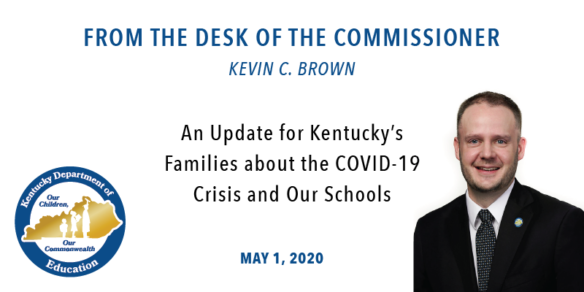
Dear Kentucky Public School Families:
In Kentucky, when someone asks you, “How are you doing?” saying, “I’m fine” is almost a reflex action. These days, however, it’s almost certainly not true.
I think it’s safe to say that none of us has truly been fine in the weeks since the COVID-19 pandemic changed all of our lives – and that’s fine.
There have been times when I have felt anxious or stressed and some mornings when I just wanted to pull the covers over my head, and I’m sure many of you and your children have felt the same way at times. And that’s OK.
So let me ask you the question again, but this time I’d like you to consider an honest, thought-out answer: How are you doing?
Your mental well-being matters so much during this time, as does that of your children. That’s why I want to use part of my message this week to talk about ways to maintain your mental health. I’ve consulted with Damien Sweeney, the program coordinator for comprehensive school counseling at the Kentucky Department of Education (KDE), about ways to do that.
Let’s start by looking at you, the parents and family members whose responsibilities in caring for and educating your children have changed so much over the past few weeks.
You’re balancing work – or the struggle associated with a job loss – the added responsibilities of helping teach your children and the everyday effort of trying to be a good parent. That’s too much for anyone to juggle for very long.
Remember, no one expects you to be the perfect parent. After all, there’s no such thing, and too often parents who try and fail to reach that standard can find themselves overwhelmed.
You’re not going to be at the top of your game every day – or even most days. You’re a normal person and a normal parent, even in those times when you’re stressed out. As long as you’re looking out for the best interests of your child and making sure his or her needs are met, that’s the only standard you need to meet.
While you’re working so hard for your child, remember to take a little time for yourself as well. There’s nothing selfish about taking care of yourself, and it’s so important to look after your own well-being as well as that of your family.
Find an hour or two to talk a walk, ride a bike, curl up with a good book or spend some time alone doing something that makes you happy. Don’t feel guilty about it, either, as long as your children are being cared for during that time and as long as you use this time to participate in something that is healthy for you and not detrimental. The world won’t stop turning just because you decide to take an hour or an afternoon or even a day for yourself .
Here are some self-care resources for parents that we recommend:
- Zero to Three: “Young Children at Home during the COVID-19 Outbreak: The Importance of Self-Care”
- Child Mind Institute: “Single Parenting During the Coronavirus Crisis”
- Child Mind Institute: “Coronavirus Parenting: Managing Anger and Frustration”
- Healthy Children: “Parenting in a Pandemic: Tips to Keep Calm at Home”
In addition, the Centers for Disease Control and Prevention offers guidance on managing anxiety and stress during the pandemic, and the National Child Traumatic Stress Network offers guidance for parents and caregivers on helping families cope with COVID-19.
Now, let’s consider the well-being of your children, the ones whose world has been turned upside down by the loss of so much that is familiar to them.
How you help your children through this unusual journey is extremely important. Check in with them on a regular basis to get an idea of how they’re feeling or what’s bothering them at a given time.
They’re missing their friends and their teachers, the games they like to play during recess and the conversations they have over lunch. They miss plays and concerts, ballgames and field trips, awards nights and proms. And there surely are times when they are as tired and frustrated as you are.
We talk a great deal in education about the value of social and emotional learning, which is simply the process through which students learn to understand and manage their emotions, demonstrate empathy for others, build positive relationships and make informed decisions. It’s an important element of education and students need it now more than ever.
It isn’t hard to help your children build these skills, either. Parents can turn almost any lesson or activity into a social and emotional learning opportunity. If your children are playing peacefully with each other, that’s a teachable moment. If they’re arguing or fighting, that’s a teachable moment.
The Collaborative for Academic, Social and Emotional Learning offers resources for both educators and parents about ways that families can promote social and emotional learning, as well as guidelines and resources on attending to the social and emotional needs of children during this pandemic.
If you need to talk to someone about your child, don’t hesitate to contact your school counselor. During this extended period of non-traditional instruction (NTI), KDE is encouraging school counselors, school social workers and school psychologists to check in with students and to offer virtual or telephone chats with students and families.
If the situation is more serious and you are concerned about the possibility of your child or someone else doing harm to themselves or another person, don’t hesitate to reach out to the National Crisis Line:
- Call (800) 273-8255; or
- Text “Home” to 741741.
Now here’s an update on some things that have happened at the Kentucky Department of Education this week:
On Monday, representatives of KDE’s Office of Special Education and Early Learning discussed the importance of meeting the needs of exceptional children with the State Advisory Council for Exceptional Children.
Associate Commissioner Gretta Hylton said it’s critical that schools make “a good faith effort” to provide services and that they regularly communicate with the families of students who typically need individualized instruction about that effort.
On Tuesday, educators shared their experiences with NTI and the lessons that can be learned during this time in a teachers webcast.
Teachers on the panel said working within KDE’s Non-Traditional Instruction Program has been challenging but rewarding.
Also on Tuesday, we encouraged Kentucky’s school superintendents to work with their communities and particularly with local health officials to determine the best option for holding alternative graduation ceremonies and other end-of-year events this spring.
KDE is issuing guidance for schools and districts on how recognitions could be conducted while complying with social distancing guidelines, as well as guidance regarding the pickup and drop-off of materials by students at the end of the school year. However, all decisions on those matters will be made by local school districts.
Finally, I told the superintendents about an April 28 story in The Wall Street Journal that indicated many districts in other states are ending the school year early without meeting minimum requirements for instructional hours because remote learning is “too tough.”
Kentucky wasn’t mentioned in that story and isn’t one of those states. I know that our students will be better for the effort that Kentucky schools and districts are making to continue NTI during this time. It has been tough, but not too tough for Kentucky.
After all, we are all in this together and we will get through this together. We are #TeamKentucky.
Sincerely,
Kevin C. Brown
To stay up to date on resources and news about what is going on in Kentucky’s education system related to COVID-19, make sure you check out KDE’s website regularly. The website contains vital information during this time of uncertainty, including frequently asked questions for parents and schools, new resources for educators and feeding sites in each district.



Leave A Comment